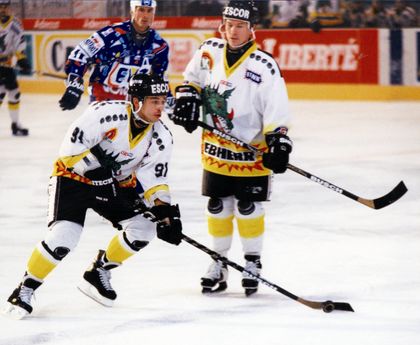As an ice-hockey nation, Switzerland has long attracted players from everywhere to enrich its championship.
In the early 90s, a wave of ex-USSR players were drawn in by the Swiss adventure, following in the footsteps of the famous duo Slava Bykov and Andrey Khomutov, shining stars under the banners of Swiss hockey club Fribourg-Gottéron (1990 - 1997).
Outside the NHL (the North American National Hockey League), the Swiss league then offered its players the most money. Those were golden years when Russians made up over a third of all foreign recruits on Swiss ice. Beyond the financial lure was also a unique framework for these mercenaries: being such a small country, bus trips never exceed a few hours, at worst.
That quality of life, a Swiss hallmark, sealed the deal for many players and their families.
It’s hard to believe that, little more than a decade later, things have taken a complete u-turn. In full economic boom, Russian hockey has been burgeoning since the start of the millennium, to such an extent that wealthy actors are now attracting the best players on the planet. “Salaries in Russian clubs can go up to four or five times higher than those paid out in Swiss clubs,” said Emmanuel Favre, a journalist and hockey specialist in Switzerland. He cites the example of American player Brett Hauer, the former defensive pillar of the Davos Hockey Club, who answered the siren call of Lokomotiv Yaroslav at the start of the 2006-2007 season.
In Davos, Hauer was making around CHF 500,000 a year. Today he’s earning three times that much. “As for Latvian Krisjanis Redlihs, though he was hired by Fribourg-Gottéron for the entire 2006-2007 season, he will not even have waited till the end of his contract.
For a salary seven times as high, the defence man took off to join the Khabarovsk Amur club, in deepest, darkest Russia.
“In a matter of a few years, Russian clubs have recuperated a great number of their players, spread throughout the NHL and in the large European championships (only two Russian players still play in Switzerland: Igor Fedulov (Geneva-Servette) and Alexander Khavanov (Davos),” notes the famous agent Gérald Métroz from Wallis. “As of recently, tsar country has even been attracting foreign players from Europe, Canada and the United States.” In Switzerland, Russian fever has affected more than Fribourg-Gottéron. It has also spread to Ambri Piotta’s offices in Ticino. “Last fall, Lokomotiv Jaroslav offered a three year contract worth CHF (?) 1 million a season to Canadians Jean-Guy Trudel and Hnat Domenichelli, and over CHF 1 million to Ambri for the transfer,” explains Emmanuel Favre.
The Leventin club declined the offer, but rumour still runs that the two players haven’t forgotten the dollars they lost on the proposed transfer to Russia.
“Trudel and Domenichelli are in any case less effective on the ice, said the journalist. “The days seem long gone when Slava Bykov and Andrey Khomutov, courted by Fribourg-Gottéron, had signed on for 150,000 a year. For them, who once earned $US 200 a month at the CSKA Moscow, the Swiss championship was an incredible deal,” recalls Métroz.
So everything has changed. The Russian hockey market, drawing on its 143 million inhabitants, has a potential today to generate hundreds of millions of dollars a year, notably in TV rights. Switzerland can’t keep up. The shoddy shape its rinks are in is, in fact, symptomatic. “Apart from Zurich, where the new Hallenstadion meets present standards, with seated spots and VIP sections, we suffer from our aging stadiums,” said Favre. At the same time, in Russia, ultra-modern temples dedicated to ice hockey are springing up everywhere.
Is an NHL-wide exodus of hockey stars towards Russia just a matter of time? The local authorities are certainly giving themselves the means to make it happen: “Vladimir Putin and his sports minister Slava Fetisov are toying with the idea of creating a Euro-pan-Asian league, along the lines of the NHL,” explained Métroz. “In that way they hope to lure back all the Russian star players and others like Swedes, Czechs, Slovaks, Finns currently playing in North America.” The irony is that top Swiss players aren’t excluding the possibility of one day making a go of it in Russia, according to Favre. “We run the risk of seeing the same phenomenon that hit football – a progressive draining of all the best players. That will leave us with a weaker championship, at the benefit of the national team.”













